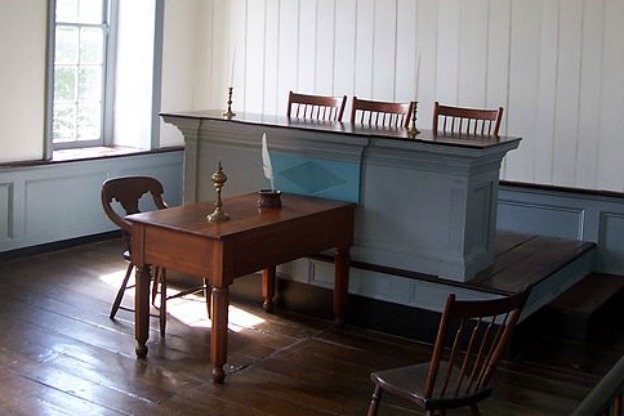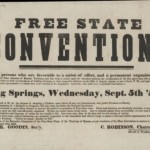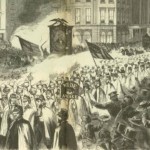During the years when slavery and African American rights were heavily debated by the public and within government bodies, the Indiana Supreme Court ruled on several cases involving free blacks, slaves, and indentured servants. The Court’s decisions in these cases were remarkable in that they were often favorable to African Americans at a time when the other branches of Indiana government were inconsistent in dealing with issues of slavery and immigration of African Americans to Indiana.
Four years after the drafters of the 1816 Indiana Constitution wrote that there would be “neither slavery nor involuntary servitude” in Indiana and that no “indenture of any Negro…hereafter made and executed out of the bounds of this state be of any validity within the state,” the Supreme Court heard the case of a slave named Polly, the daughter of a slave purchased by General Hyacinth Laselle before Indiana became a state. The Court freed Polly, ruling that the constitution “intended for the total and entire prohibition of slavery in the State.” In 1821, the Court ruled in In re Clark, that G.W. Johnson’s indenture of his servant, Mary Clark, was invalid as Clark’s indenture would ultimately create a demoralizing state of servitude that was equal to that of slavery. When the case of Baptiste vs. State came before the Court in 1840, the court reversed an order to remove George Baptiste from the state for not paying the bond required of free blacks who moved to the state.
Even after Indiana adopted a new constitution in 1851 with more strict provisions against African Americans, the Indiana Supreme Court still ruled favorably for blacks. For example, after John Freeman, a prosperous African-American businessman, was falsely arrested in 1853 on charges of being a runaway slave from Missouri and was subjected to abuse and extortion at the hands of a federal marshal, the Supreme Court ruled in 1855 that Freeman had the right to sue the marshal for assault and battery, as well as extortion.
As these cases demonstrate, at a time when other branches of government proved inconsistent on matters of African American rights, the Indiana Supreme Court’s rulings “constituted a remarkably strong and usually steady affirmation of human rights.”
Source: Randall T. Shepard, “Slave Cases and the Indiana Supreme Court,” Traces of Indiana and Midwestern History 15 (3): 34-41.
A Moment of Indiana History is a production of WFIU Public Radio in partnership with the Indiana Public Broadcasting Stations. Research support comes from Indiana Magazine of History published by the Indiana University Department of History.























